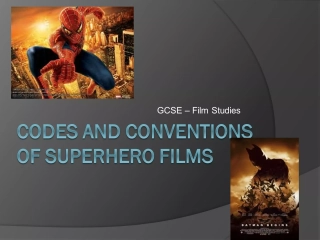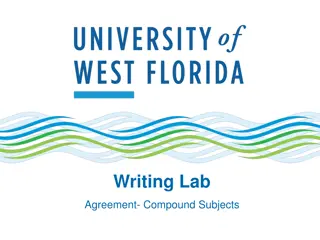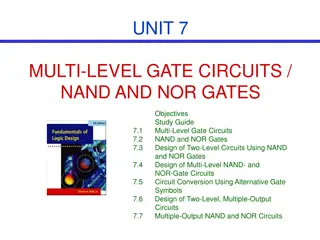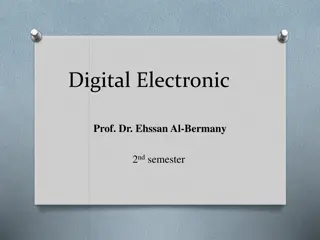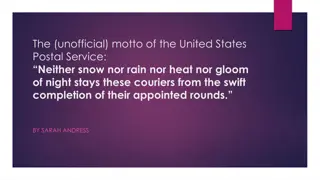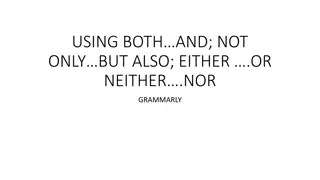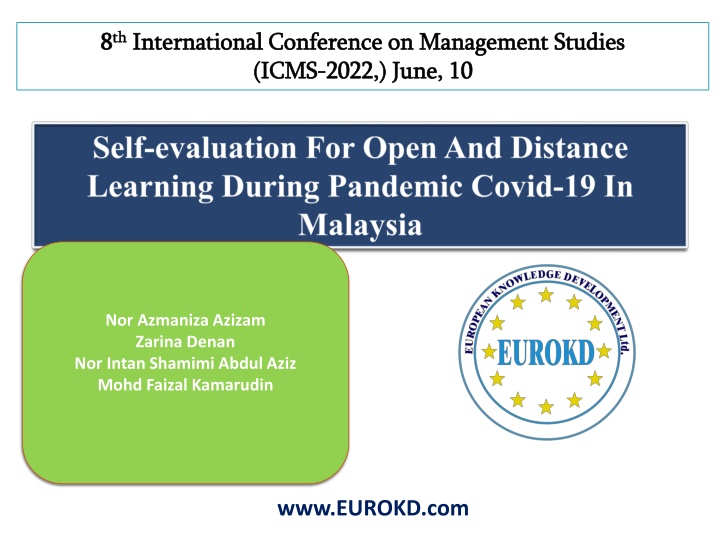
Enhancing Teaching Evaluation Framework at UiTM: Insights from ICMS-2022
Explore the innovative teaching evaluation framework implemented at UiTM, focusing on self-evaluation and holistic approaches. Learn from experts at ICMS-2022 about fostering educator excellence and student outcomes assessment. Dive into the world of management studies to enhance teaching methodologies and inspire educators for a brighter future.
Download Presentation

Please find below an Image/Link to download the presentation.
The content on the website is provided AS IS for your information and personal use only. It may not be sold, licensed, or shared on other websites without obtaining consent from the author. If you encounter any issues during the download, it is possible that the publisher has removed the file from their server.
You are allowed to download the files provided on this website for personal or commercial use, subject to the condition that they are used lawfully. All files are the property of their respective owners.
The content on the website is provided AS IS for your information and personal use only. It may not be sold, licensed, or shared on other websites without obtaining consent from the author.
E N D
Presentation Transcript
8 8th thInternational Conference on Management Studies International Conference on Management Studies (ICMS (ICMS- -2022,) June, 10 2022,) June, 10 Nor Azmaniza Azizam Zarina Denan Nor Intan Shamimi Abdul Aziz Mohd Faizal Kamarudin www.EUROKD.com
Authors Photos Nor Azmaniza Azizam Zarina Denan Nor Intan Shamimi Abdul Aziz Mohd Faizal Kamarudin ICMS-2022 2
Authors short biographies Biography Nor Azmaniza Azizam is a senior lecturer at faculty buisness. She received her PhD from Universiti Kebangsaan Malaysia (UKM She has published papers in variousjournals and conference proceedings. She is the recipient of several research grants; including internal and national grants. Her research interests include health economics and health management Zarina Denan ICMS-2022 3
Authors short biographies Nor Intan Shamimi Abdul Aziz works as a lecturer at Universiti Teknologi Mara (UiTM), Malaysia. She holds a Master's Degree in MBA (Healthcare Management) from Universiti Teknologi Malaysia (UTM) and is currently pursuing her PhD (Management) at Universiti Putra Malaysia (UPM). Her area of interests include management, behavior, and technology in healthcare. Mohd Faizal Kamarudin is a lecturer of the Faculty of Business and Management, Universiti Teknologi MARA (UiTM). Prior to joining UiTM, he was with CIMB Islamic Bank Berhad where he was entrusted with credit analysis, product development, and training. He obtained his MBA from International Islamic University Malaysia. He received his bacholer degree from Universiti Teknologi MARA Malaysia. He had published papers in journal and conferences papers. To date, he involves in training and consultancy projects on Islamic finance, zakat management and financial management with Ministry of Finance, Amanah Raya Berhad and Felda. For his research exploration, he has obtained several grants from the Ministry of Higher Education, Malaysia. Since 2013, he has also been an evaluator for the Malaysia Qualification Agency for Muamalat and Islamic Finance programme. ICMS-2022 4
Introduction Teaching evaluation is a critical component to ensure excellent teaching process at UiTM UiTM has adopted a holistic teaching evaluation framework and self-evaluation for teaching and facilitation activities starting Semester II 2019/2020 A lecturer s self-evaluation is one of the fifth pillar initiatives in Education 5.0@UiTM, which is Inspiring Educators. ICMS-2022 5
Introduction A UiTM lecturer must be professional, knowledgeable about course content, and skilled in facilitating teaching delivery and assessing student learning outcomes A 360-degree evaluation involves assessment by students through student feedback online (SuFO), colleagues via Online Lecturer Professionalism Monitoring (PRO-PENS) ICMS-2022 6
The Literature Review The educational system is exposed to external threats with the rapid increase in Covid-19 cases globally (Bozkurt & Sharma, 2020) Ribeiro (2020) suggested that the digital transformation of teaching and learning facilitation results in an abundance of logistical and behavioural changes. Technology and internet connections are integrated into online learning, whereas educators and students with poor internet access are left behind. Online learning s dependence on technological equipment poses a substantial challenge for institutions, academicians, and students. ICMS-2022 7
The Literature Review High-quality online teaching is critical to replace the face-to-face teaching method as the Covid-19 virus infects people who fail to self-distance. Besides, a high-quality online delivery is difficult and time-consuming than the traditional teaching method. Advanced planning and preparation alongside personalised feedback and help (Dubey & Singh, 2020) are essential for high- quality online lessons. Furthermore, some students depend on electronic gadgets, such as computers and smartphones, and free internet on the campus due to socioeconomic differences (Demirbilek, 2014). The transition process of these disadvantaged students is expected to be slower as they cannot attend university because the university closed during the Covid-19 pandemic. ICMS-2022 8
Research Question(s) The researcher evaluated ODL among lecturers and students from the FBM, UiTM during the Covid-19 pandemic. Three research questions (RQs) were addressed in this study: RQ1: What is the level of teaching practices for ODL among lecturers from all FBM campuses? RQ2: What is the level of lecturer s professionalism and teaching and learning activities for business and management courses rated by students? RQ3: Do gender, years of teaching experiences, campuses, and position predict teaching practices and professionalism among lecturers? ICMS-2022 9
Methodology Participants The study was undertaken during the semester between October 2020 until February 2021 by utilizing faculty-level data collected by the Academic and International Office, UiTM. The data on TESA-ODL scores were collected from lecturers in UiTM s FBM campuses throughout Malaysia. The SuFO data was collected from students in the FBM, UiTM campus in Selangor. ICMS-2022 10
Methodology Measures TESA-ODL questionnaire measures the lecturer s teaching practices, effectiveness and professionalism for ODL. This instrument was developed by the Academic Affairs Division (HEA) of UiTM TESA-ODL questionnaire was designed to evaluate several ODL relevant constructs: delivery and content provision, universal design for instruction, engagement, task assignment, motivation and empathy, support and feedback, and reflective practice Academicians rating on ODL delivery was collected using a five-point Likert scale ICMS-2022 11
Methodology Source: Academic Affairs Division (HEA) of UiTM ICMS-2022 12
Methodology Data Analysis The data was analyzed using by using Statistical Package for Social Science (SPSS) version 25. Means, standard deviations, and frequency of the study variables were estimated using descriptive statistics The differences in teaching practices score measured using TESA-ODL were examined using an independent t-test. A linear regression analysis was performed to determine predictors for TESA on ODL delivery. The value p < 0.05 was considered statistically significant. ICMS-2022 13
Results Table 2: Demographic profile of the respondents (lecturers) (n = 766) Characteristics Gender Category Male Female n 203 563 319 447 6 116 502 26 3 70 43 81 685 Percentage 26.5% 73.5% 41.6% 58.4% 0.8% 15.1% 65.5% 3.4% 0.4% 9.1% 5.6% 10.6% 89.4% Years of experience Less than ten years More than ten years DM41 DM45/46 DM51/52 DM53/54 VK7/6/5 Part Time-Full Time (PTFT) Part Time Selangor Campuses Non-Selangor Campuses Position Campuses ICMS-2022 14
Results Table 3: TESA-ODL and SuFO scores Items Mean Standard Deviation TESA 171.28 16.68 SuFO Section A: Overall Impression about the Course 88.88 4.20 Section B: Lecturer Professionalism 88.27 5.14 Section C: Teaching and Learning Activities Section D: Infrastructure 88.75 5.08 85.87 4.64 Mean Point (%) 88.19 4.52 ICMS-2022 15
Results Table 4: Association between variables Variable Mean Standard Deviation p-value Gender Male Female Position Permanent Part time-full time Years of experience Ten years and below More than ten years Campus Selangor Non-Selangor 4.34 4.26 0.43 0.41 p = 0.032* 4.28 4.33 0.42 0.39 p = 0.145 4.33 4.25 0.40 0.42 p = 0.013* 4.37 4.27 0.39 0.42 p = 0.016* ICMS-2022 16
Results Table 5. The predictors of TESA-ODL scores in multiple linear regression model TESA-ODL Score (n = 766), Adjusted R2 = 0.015) 95.0% Interval Confidence p- value 0.040 0.030* Lower Bound -5.461 -8.310 Upper Bound -0.126 -0.429 Variable Gender Campus Beta t -0.074 -0.081 -2.056 -2.177 Years of Teaching -0.087 -2.185 0.029* -5.586 -0.298 Position -0.003 -0.065 0.948 -3.904 3.653 ICMS-2022 17
Discussion The findings showed that most lecturers regard themselves as experts in teaching practices and professionalism in ODL The FBM Learning and Teaching Unit organised training and workshops for ODL throughout 2020 to enhance digital competencies among academic staff when conducting online classes. Among the training organised were Telegram & Loom training, Quizzes and Games Training, Telegram 2.0: Apps for Education, e-assessment with Google, e-assessment Training for ODL, Discovery Padlet for New Future Virtual Classroom, and others. Thus, lecturers have been equipped with information on improving their instructional materials and recommended adopting multimedia-enhanced contents and educational tools ICMS-2022 18
Discussion The high TESA-ODL scored by lecturers was supported by excellent feedback from students on the lecturer s professionalism and teaching and learning activities on various academic courses during ODL. The high score suggests that online learning has a good impact on student s learning in FBM. Previous evidence reported that online learning could outperform traditional face-to-face learning (Peine et al., 2016; Elfaki et al., 2019). The use of various digital technologies at the undergraduate level was also emphasised to boost student behavioural and emotional involvement. ICMS-2022 19
Discussion The FBM offered both asynchronous and synchronous classes by considering these challenges. Lecturers prepare assignments or record lectures where students can complete them at their own pace in asynchronous classes. This method assists students with limited internet access and considers students preferences and attitudes towards online learning. Alternatively, learning is conducted at a particular time via a specific platform such as Google Meet, Google Classroom, and an in-house platform known as UFUTURE in synchronous classes. According to Malik et al. (2017), male students favoured synchronous and asynchronous activities or lectures more than female students. Additionally, students were more interested in synchronous activities when given credit in the form of grades (Lew & Nordquist, 2016), which explains the high SuFO scores. ICMS-2022 20
Conclusion Online education is a new fascinating option to limitless learning and has positively impacted learners and academicians have optimistic opinions about online classes. The findings showed that the lecturers in FBM understood the ODL concept as many felt comfortable and were willing to learn about the usability of mobile apps and technology for ODL classes. The lecturer s professionalism and teaching and learning activities are two factors that contribute to an overall high rating on academic courses during ODL from the student s perspective. Gender, years of teaching experiences, and campuses are predictors of the TESA-ODL score. The faculty will continue to monitor, review, evaluate and improve the teaching and learning process through ODL in the FBM to maintain the quality of UiTM graduates. academicians. Students and ICMS-2022 21
For Scientific Heroes www.EUROKD.com ICMS-2022 22

